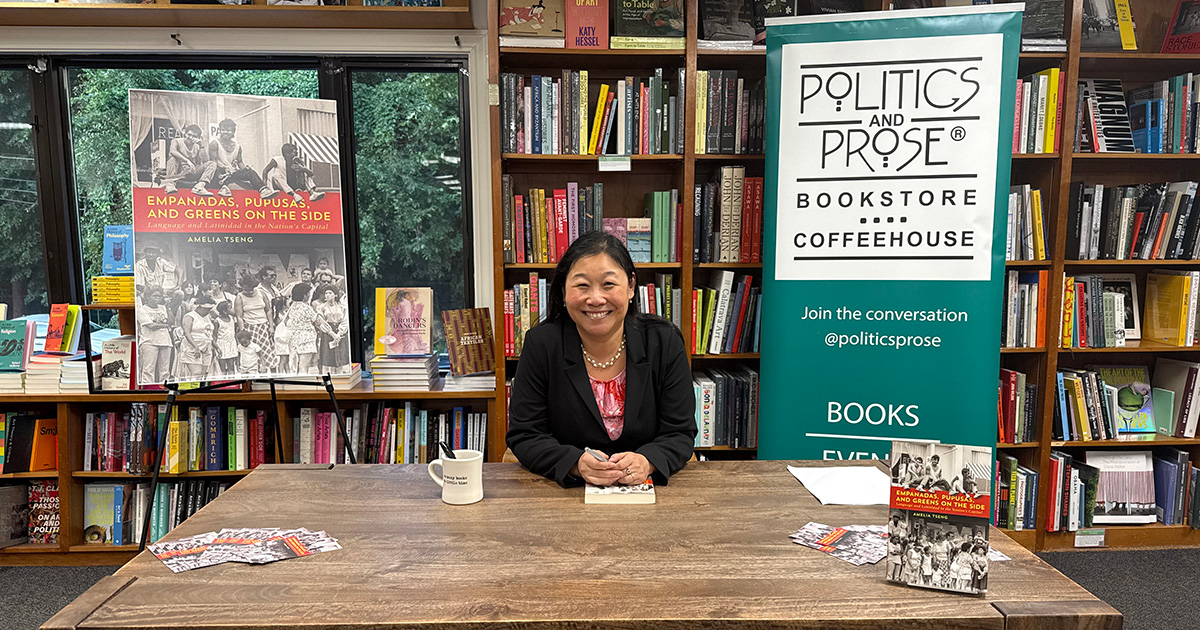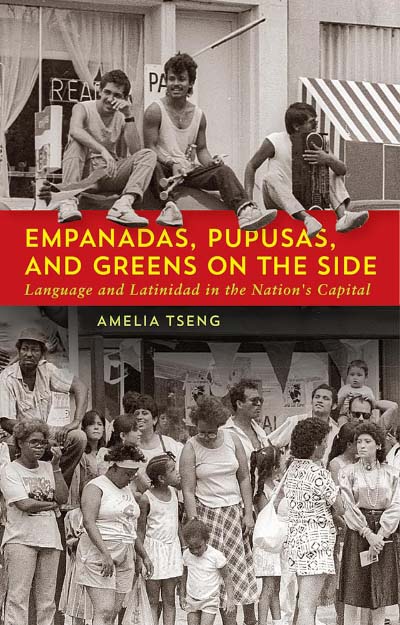Empanadas, Pupusas, and Greens: Book Explores DC Latinx Identity

What do empanadas, pupusas, and collard greens have in common?
According to linguist Amelia Tseng, they’re all part of a rich, unfolding cultural story in Washington, DC. Tseng, a professor in American University’s Department of World Languages and Cultures, explores this story in her new book, Empanadas, Pupusas, and Greens on the Side: Language and Latinidad in the Nation’s Capital (Georgetown University Press, 2025). It’s the first book to examine how DC’s Latinx communities have both influenced and been influenced by the city’s Black culture and language.
Drawing on more than a decade of ethnographic research, Tseng paints a vivid picture of how language, identity, and race come together in DC. The city, long known for its powerful Black identity and cultural influence, became a major destination for Latin American immigrants beginning in the 1980s. As the two communities interacted, something unique emerged. “DC was famously Chocolate City, a proud majority-Black city and African American cultural center,” Tseng says. “Latinx immigrants who came to DC, especially pre-gentrification, were immersed in this culture. This led to a strong African American influence in DC-area Latinos’ language and culture. And in turn, DC ‘Latinidad’ has contributed to wider Washingtonian culture, from savory Salvadoran pupusas to Latino influences in the iconic local Go-Go music.”
Language, Culture, and Belonging
 When she set out to write Empanadas, Pupusas, and Greens on the Side, Tseng wanted to make sure it was accessible to all audiences. “My hope is that everyone will be able to see themselves in this book a bit,” she says. “And if it’s used in college classes, young Latinxs will be able to see themselves and be inspired, and others will learn something new. I think the book will resonate with many people, regardless of their backgrounds. It’s also a great way to find out more about DC.”
When she set out to write Empanadas, Pupusas, and Greens on the Side, Tseng wanted to make sure it was accessible to all audiences. “My hope is that everyone will be able to see themselves in this book a bit,” she says. “And if it’s used in college classes, young Latinxs will be able to see themselves and be inspired, and others will learn something new. I think the book will resonate with many people, regardless of their backgrounds. It’s also a great way to find out more about DC.”
The book is rooted in Tseng’s Washington, DC, Latinx Language and Identity Project (DCLIP), a long-running research initiative that explores how multilingualism, dialects, and urban change shape Latinx identity. The book includes nearly 100 sociolinguistic interviews and surveys with DC-area Latinxs, as well as ethnographic and archival work in collaboration with the Smithsonian Center for Folklife and Cultural Heritage, and it was supported at different stages by AU’s Center for Latin American and Latino Studies, the AU Metropolitan Policy Institute, Georgetown University, and the National Science Foundation.
This deep academic and community engagement reflects Tseng’s long connection to the nation’s capital. Having lived in DC for almost 15 years, she sees this work as a natural extension of her own roots. “I’m a person who believes in working with communities rather than ‘helicoptering’ in, extracting data, and leaving,” she explains. “I also believe in the importance of local context in understanding social science research. People have been incredibly generous in sharing their time, thoughts, and experiences with me, and I’ve put down roots and try to give back to the community in all the ways that I can.”
The idea of identity is also personal to Tseng, who grew up in a Chinese immigrant family, in a bilingual home, in a heavily Latinx area in the Southwestern United States, where Spanish and English were everywhere. “From early on, I saw how language shaped identity and how people treated you,” she says. “I always felt like an insider and outsider at the same time, which made me curious. When I took my first linguistics class, it felt like everything clicked—I realized the things I’d experienced were part of something much bigger. That eventually led me to grad school in DC, and now I’ve put down roots here. I’m raising two little chinolatinos who will be DMV natives and explore their own Asian Latino identities.”
“Astute and Engaging”

The buzz around Tseng’s book is growing. She appeared at Washington, DC's Politics and Prose bookstore on July 7 for a public reading and conversation, and the reading was featured in Washingtonian magazine as a “Top Best Things to Do in DC” article.
Scholars praise the book, too. Jonathan Rosa of Stanford University calls it “an essential contribution to scholarship on Latinx linguistic practices and identities.” Georgetown University’s Natalie Schilling describes it as “an astute and engaging examination of an important yet often overlooked DC-area cultural group.”
Tseng’s research has long bridged the gap between academia and the broader community. She coordinates AU’s Linguistics Program, serves as affiliate faculty in the Department of Anthropology and Center for Latin American and Latino Studies, and previously directed AU’s Bilingual Education program. From 2016 to 2022, she was a research associate at the Smithsonian Center for Folklife and Cultural Heritage. Her work has been supported by the National Science Foundation, the Society for Applied Anthropology, and other leading institutions.
With Empanadas, Pupusas, and Greens on the Side, Tseng offers a new lens for understanding how communities create belonging through language, culture, and shared history. “Language and culture are always evolving, so things are always gained and lost. It’s really about the mix,” she says. “Many wonderful things come from cultural mixing—salsa is a good example, or Latin music as a whole, which is a combination of African, Indigenous, and European influences, and there are countless other examples.”